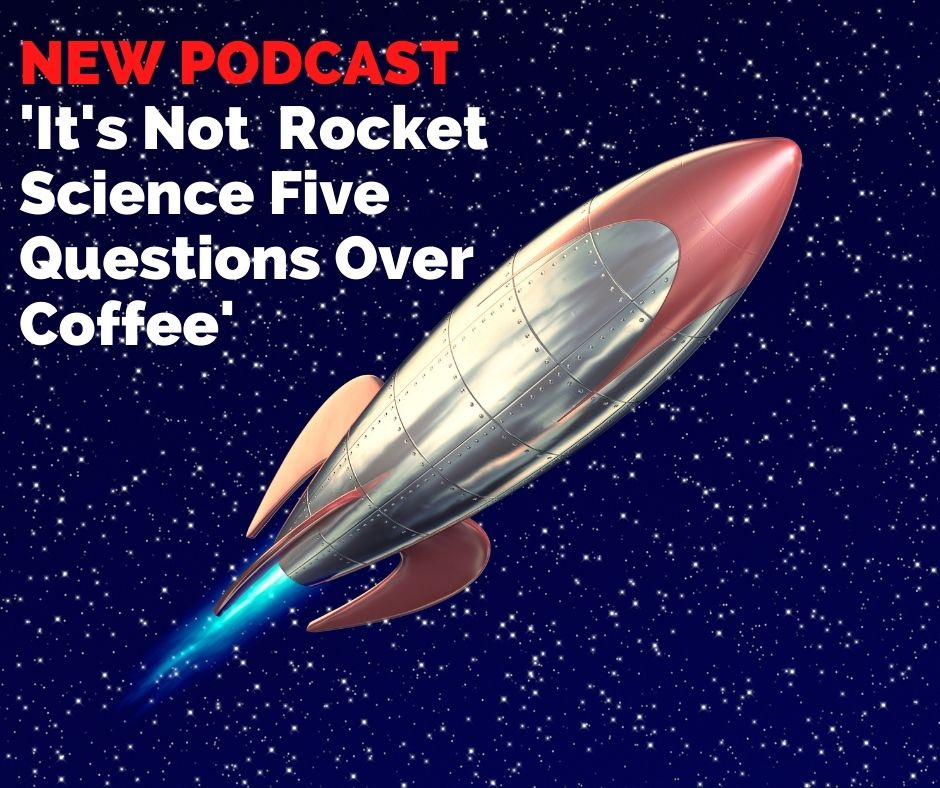Who is James?
James Bolle is helping small business owners attract the best team members and make them more loyal, engaged and motivated by inspiring them to discover Purpose - and live it authentically.
Key Takeaways
1. We live in a society where there's this kind of culture around leadership, they might believe that it's just about them. And they believe that they can come in and engage their team through sheer force of personality. So they're going to try and inspire everybody individually, they think it's up to them to provide perks to provide meaning to everybody, they think it's all down to them. And it's just not sustainable.
2. The fundamental problem is that they're working in an environment where they don't believe that what they do matters, the only people that benefit from their success are the people that own the business. And the only benefit that's delivered to them is that they get richer. So the fundamental underlying problem doesn't get solved by these solutions.
3. We define purpose as having four 'A's, an authentic aspirational call to action for an organisation and its stakeholders that advances the cause outside the organisation. So when you pursue your purpose, when you run your business day to day, you benefit other people just by doing your business and purpose can make people 30% more productive. 40% more engaged three times more loyal, it can attract customers to your business, it can attract the right team members to your business.
Valuable Free Resource or Action
https://www.prpsfl.com/purposequiz
A video version of this podcast is available on YouTube :
and on linkedin : https://www.linkedin.com/posts/stuartwebb_james-runs-prpsfl-to-help-small-business-activity-6869004903658991616-jfZL
————————————————————————————————————————————-
Subscribe to our newsletter and get details of when we are doing these interviews live at https://TCA.fyi/newsletter
Find out more about being a guest at : link.thecompleteapproach.co.uk/beaguest
Subscribe to the podcast at https://link.thecompleteapproach.co.uk/podcast
Help us get this podcast in front of as many people as possible. Leave a nice five-star review at apple podcasts : https://link.thecompleteapproach.co.uk/apple-podcasts and on YouTube : https://link.thecompleteapproach.co.uk/Itsnotrocketscienceatyt!
Here's how you can bring your business to THE next level:
1. Download my free resource on everything you need to grow your business on a single page : https://link.thecompleteapproach.co.uk/1page
It's a detailed breakdown of how you can grow your business to 7-figures in a smart and sustainable way
2. Join The Complete Approach Facebook Group : https://TCA.fyi/fb
Connect with like-minded individuals who are all about growth and increasing revenue. It's a Facebook community where we make regular posts aimed at inspiring conversations in a supportive environment. It's completely free and purposely aimed at expanding and building networks.
3. Join our Success to Soar Program and get TIME and FREEDOM. : https://link.thecompleteapproach.co.uk/Success-to-Soar
If you're doing 10-50k a month right now: I'm working with a few business owners like you to change that, without working nights and weekends. If you'd like to get back that Time and still Scale, check the link above.
4. Work with me privately
If you'd like to work directly with me and my team to take you from 5 figure to 6 and multi 6 figure months, whilst reducing reliance on you. Click on https://link.thecompleteapproach.co.uk/DiscoveryCall tell me about your business and what you'd like to work on together, and I'll get you all the details.
_________________________________________________________________________________________________
Transcript
Note, this was transcribed using a transcription software and may not reflect the exact words used in the podcast)
Stuart Webb 0:22
Hi again and welcome to It's not rocket science five questions over coffee. I'm standing by with my coffee, which is in my beer mug today. And James, I think you've got some water there in front of you.
James Bolle 0:34
So we're water from a plastic cricket ground. Yeah.
Stuart Webb 0:38
We're ready to go James Welcome to it's not, it's not rocket science by questions of COVID. James, it runs a consultancy organisation called purposeful. And you'll see that slightly differently spelt to the way in which it's spelt in the dictionary later on. But purposeful is an organisation which gets people to under stand, how their organisation builds purpose into what they're doing, so that they can retain stuff, etc. So we're gonna have a fascinating discussion. And James, welcome to the podcast.
James Bolle 1:08
Thank you for having me, Stuart. It's great to be here.
Stuart Webb 1:10
Terrific. Well, let's start with the the first question I always start with what's the, what's the the problem that you're trying to solve in your ideal client.
James Bolle 1:19
So when I think about my ideal client, I actually picture somebody who I helped before. And I'm going to call him, Paul, because that's his real name. And Paul is a as a leader of a team, he has a team of 15 people. In this case, he's actually the managing director of a computer games company, but he might be leader of the team in a services organisation or software business or recruiter, he might be a leader of a team in a larger manufacturing organisation, even but what he's got is a problem because he wants to be a good guy, he wants his team to be happy, not least, because it is taking up a lot of his time to manage and keep them happy. But he wants his team to be happy. He wants people to be living good lives, and he wants to be successful. But he's got a problem. People just aren't his hard work running the team. And actually, most of the time, the majority of his job is spent trying to lead his team to do things rather than actually growing his business or growing the team. People keep leaving, people need constant motivation to get anything done. The initiatives that He's launching, keep falling flat, people do them for a couple of days, and then fall back into old habits. And when he's not around, people either don't make any decisions, or even worse, they make the wrong ones things that aren't good for customers, things that aren't good for business. And pool just wishes that there was something to bring everybody together to make it slightly easier for him to run his team. So they can all get on the same page, and they can be more effective. And so that's the that's the challenge that the pool was facing. And I think it's a challenge that a lot of leaders will recognise when they hear.
Stuart Webb 3:04
So what's the thing that Paul or hope or Pauline, or whoever has been trying to do to resolve that problem without getting out.
James Bolle 3:14
But I think that's an important point. Stewart, it could be, it could be Paul, it could be Paula Paulo, however you want to however you want to pronounce it. And what Pauline, or Paula has been doing wrong is like many leaders, I mean, you see it and government surveys, there's lots and lots of small business owners lots and lots of team, they just feel like the performance of their team is going to inhibit their growth. And unfortunately, because we live in a society where there's this kind of culture around leadership, they might believe that it's just about them. And they believe that they can come in and engage their team through sheer force of personality. So they're going to try and inspire everybody individually, they think it's up to them to provide perks to provide meaning to everybody, they think it's all down to them. And it's just not sustainable. When you've got a team of 1015 people, you can't spend all of your time motivating everybody, you need to find something that enables them to motivate them selves from within. So the first the first challenge, or the first problem, the first mistake that poor will make is that she will try and solve everything herself that the other thing that she might do incorrectly is because one of the symptoms that she's dealing with here is the team don't seem happy. She may buy an app, or a perk scheme that on the surface should deal with some of the symptoms she's facing, but actually doesn't get to the underlying problems. So she might find a great system that enables them to get discounts or team to get discounts at Alton Towers, or to get access to a mindfulness app. So and then these things undoubtedly will make a small difference but don't to deal with the underlying fundamental challenge, which is that her team, in order to be satisfied in their lives and their work, want to feel like they're getting better at something that matters. And the fundamental problem is that they're working in an environment where they don't believe that what they do matters, the only people that benefit from their success are the people that own the business. And the only benefit that's delivered to them is that they get richer. So the fundamental underlying problem doesn't get solved by these, by these by these solutions that the poor poor undertakes.
Stuart Webb 5:34
And that is a fiendishly difficult problem to sort of crack with papering over the surface, isn't it the, you know, the, I remember a very clear example of somebody in my past where they decided they could solve the problem by giving everybody a slightly better car, and they got a slightly better car, and for a week, they were happy, but then they started getting to the Yeah, but you know, now that car requires more fuel to make it go. So I need an increase in pay, because I'm spending more money on fuel because, and it became one of these sort of downward spirals and no matter how hard they tried, that was never the answer. There were always other problems that that encrypted sort of incidentally created around the edges.
James Bolle 6:15
There always are more problems. And ultimately, if the only thing that you can fall back on to try and motivate people to work harder is money, there's always going to be somebody else that can pay better, better money or offer a package that that is more suitable for people, you need to enable them to find their intrinsic motivation for doing a fantastic job feed for your business and your customers. And a nice car helps being paid a lot of money helps, but it's it's window dressing, if the fundamentals are in place.
Stuart Webb 6:46
Right. So I'm hoping that there's a solution to this and James, that you can sort of point us in the direction with a valuable free action or free resource that people listening at the moment can actually take and work through on their business.
James Bolle 7:01
So if you accept the premise that what people want to be happy in their lives and to be motivated, just to feel like they're making progress, if something matters, what we need to do is show people that the work that they're doing matters in and of itself, not because it's making you money, not because it's making them money, but because it makes the world a better place. That is what I call purpose. And its purpose is a term that you will hear bandied around a lot purpose in in an extra in a nutshell, not in an extra that'd be weird. In a nutshell, purpose is this idea that the business the organisation you're working in, has a reason to exist beyond just making money. We define purpose as having four aces, an authentic aspirational call to action for an organisation and its stakeholders that advances the cause outside the organisation. It's authentic, is aspirational, action oriented, and it advances others. So when you pursue your purpose, when you run your business day to day, you benefit other people just by doing your business and purpose can make people 30% more productive. 40% more engaged three times more loyal, it can attract customers to your business, it can attract the right team members to your business. And organisations that authentically live a purpose are several times more likely to be profitable, and they grow more quickly than organisations that don't have purpose when it's authentically left. So the solution here is to focus on the benefit that your organisation delivers to society by being in business that helps you differentiate it helps you attract the right team members and attract the right customers and a virtuous circle grows. The challenge is, do you have purpose. And the free resource that I'm offering people today is my quiz. The my purpose quiz, which you can take on my website, which is coming down the bottom of the screen now as if by magic purposeful.com. That's PRPs fl.com/purpose quiz. You can complete that quiz. And it will help you to assess whether you have purpose today in your organisation in line with those forays. Is it authentically lift? does it drive action? Is it aspirational? And does it advance others? Once you've taken this quiz, we'll send you an email report to help you understand how you can maybe drive a more authentic purpose or improve the understanding of your purpose within your organisation and yield some of those great results that will solve your problem. Paul, Paula poorly of people leaving your organisation people not making the right decisions, people not working hard enough.
Stuart Webb 9:44
Brilliant and as I said at the top, that is how you spell the name of your organisation isn't it? It's purposeful, but it's PRP SFL purposeful is just missing all of those that are really things that just get in the way and trip us up.
James Bolle 9:59
Like Like profit led businesses vows a very 20th century steward we're worth we're trying to take them out wherever, wherever we can, also helps you to register a unique URL if you take them all out.
Stuart Webb 10:12
So I guess you've come to this understanding through sort of having read and been influenced by a number of things. And so I'm gonna ask you that, what is the book or concept or programme that's influenced you or brought you to where you are today that you want to share with us, James?
James Bolle 10:28
Well, this spark was really lit by Simon Sinek. Start with y, which came out in 2009. And I know that you're not surprised by that I suspect people watching this won't be surprised either. It's a very famous book, his TED talk, the Golden Circle is the third most watched TED talk of all time. Simon Sinek, in this book says people don't buy what you do, they don't even buy how you do they buy why you do it. There's not the book I'd recommend. However, the book I would recommend is his follow up, find your why. Which is a great guide to actually figuring out what your WHY might be his, you know, it's a book that has inspired me in how I talk with organisations and do so yeah, check out Simon Synnex. Find your why. Because there's lots of great tips in there to help you find a purpose for your organisation or for yourself personally.
Stuart Webb 11:18
Brilliant. So, James, there is only one question left. And it's the question that I make sure that I've not had to do any research or thinking about which is, what's the question that you would have liked me to have asked you should we have had this conversation with on your terms? And please make sure as I often say to people, don't leave us in suspense, answer the question for us, as well. So, so the floor is yours to tell me what you would have liked me to have asked. And I'll marvel in the fact that we're probably a better question I could have thought of,
James Bolle 11:49
well, I don't know that it will be a better questions do I mean, I like I like a good debate. And I would have liked you to ask me. Why does this? Why does this matter now? Like, why are people getting excited to this idea of purpose now? Because it, you know, I've talked about some of the business benefits of authentically living a purpose, an organisation of the greater engagement, greater loyalty, greater motivation, greater productivity, these things are brilliant. But it's not why I'm inspired by purpose. I'm inspired by purpose, because in the UK, our productivity is completely stagnant. And there are lots and lots of people who do jobs to make money to pay for a lifestyle outside of work, they're just surviving, and they spend 910 hours a day, doing jobs that suck at their souls. And I firmly believe that we will reach a happier place as a society and in our communities, if we can find a way to connect people to the benefits that is brought to society in the jobs that they do. If you are happy at work, you go home, you're more likely to be happy with your family or with your friends, you're more likely to contribute positively to your society, your community and your local economy, you are more likely to be a good citizen. Having a job that 10 hours a day sucks the life out of you is torture. And I know there are some people who would love to have a job that pays them for 10 hours a day. And we should be grateful for the jobs we have. There are lots of people less fortunate than us, I appreciate that. But once you're in a job, you should be able to feel like you are making progress at something that matters. It is an aberration in modern society, that we have set up organisations whose only benefit whose only purpose is to make money for their owners. And actually, if we can connect people to the purpose of their jobs, and make them feel more connected, and that they matter more, we are going to get a happier society by default. And that's why that's why we should do this, our society will be better. And I think we have a moral obligation actually, as leaders and as business owners, to show the people we're working with that they matter, and that we are making the world a better place as we work. And I'll be honest, most 21 year olds coming into the workplace believe that as well today, and so you need to get on this bandwagon now. lest you be left behind. I really think we can. We are at a crossroads and we can together make our country a better place to live. And that's why I think it really matters now.
Stuart Webb 14:31
I think it's an interesting point change and I will only add to it that I think too many leaders of organisations or team leaders, those calls and poor leaders that we've just discussed to perhaps forget that the people who are working in the organisation run perfectly good organisations when they leave the office floor or wherever they go. Because at home, they run church groups, they run Scout groups they run family budgets that balance they're capable of resolving difficulties within The scout group. And yet, whenever you ask them, you know, to take on responsibility at work, they'll go, well, that's not what I'm paid to do, you know, we've don't tap into the latent talent of people because we don't inspire that purpose within them, do we, we allow that latent talent to just be left at the factory gate. And all of that, that they bring with them, there's personal points that they could actually contribute to work is left at the factory gate, because they don't believe the purpose that they're serving is enough to inspire them to bring all of that to the fore and say, I'll take a step up, I'll take on that I've done it before I've even if I'd haven't done it before. I know it's something I want to try. And we just don't, it's fine.
James Bolle 15:40
You're absolutely right, because, subconsciously, the question that they're asking themselves, when you're asking themselves a problem is, I could do that. But the benefit of that will be maybe you get a slightly nicer car at the end of the year, or a faceless shareholder will get slightly richer, I don't really see why that would benefit anybody. And so you're relying on finding those people with personal pride and personal motivation to do it. And everybody has that personal motivation if we put them in the right circumstances. So yeah, I couldn't agree more.
Stuart Webb 16:10
Brilliant. Listen, James, this has been a really fascinating discussion. And it's a fascinating topic. You're absolutely right, the people who are currently at university that we as business leaders need to grow our businesses in the next 10 years, are sitting there wondering what's going to inspire me to join your organisation less, we are going to come up with something other than you'll get a nice pension, which you know, let's face it is something they're probably thinking that's a long way down the road. And frankly, the world will have heated up by then and I won't be able to make use of it. Let's be honest with them. And let's start looking at things that we can say, we have got a purpose for you being here and it will benefit society will benefit the world. And let's drive at home. So James, thank you so much for your for your time today. Really appreciate the time you've had with us. If you would like listening to be able to join people like James alive to see the messages that they gave here on it's not rocket science five questions over coffee I do. Make sure that's the hand action that that we don't use anything else five questions over coffee. This is the need to go to go to https colon, forward slash forward slash TC a dot FYI, forward slash subscribe. That's TC a dot FYI, forward slash, subscribe, get on the mailing list. We send you an email on a Monday morning saying who's coming on this week? You got the time you can get on Listen, interact as necessary. James, thank you so much for being on. We wish you purposeful, all the best. And I look forward to speaking again to to your next week. Thanks very much. Thanks, Jeff. Bye














Share this post